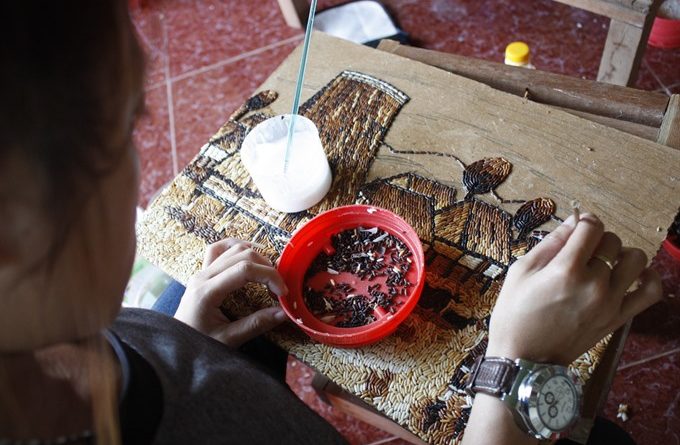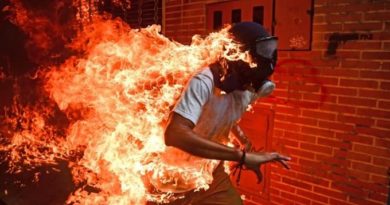Painting: Rice paintings in Kon Tum highlight Central Highlands
| Participation: A tourist learns to make a rice painting under the guidance of Đăng. — Photo Courtesy of Hồng Điệp |
Viet Nam News
.
Kon Tum City, the capital of Kon Tum Province bordering Laos and Cambodia, is recognised for a massive assembly of ethnic groups and their distinctive cultures.
Part of its long history in Central Highlands culture are rice paintings. The best place to witness these paintings is at Hồ Village, located at Bắc Kạn Street, Kon Tum City. The village offers visitors a visual feast in art works.
The paintings vary from calligraphic, the daily activities of the local people to cultural features of ethnic groups and their traditional housing near Đăk Bla River and big forests.
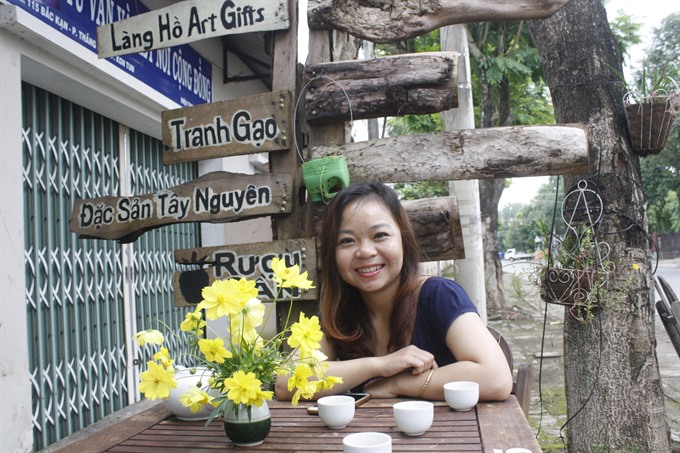 |
| New shop: Đăng plans to open another gallery at Kon Ktu village so tourists can experience or create their own rice paintings. — Photo Courtesy of Hồng Điệp |
.
Painter Nguyễn Kiều Đăng, who founded the Hồ Village rice painting gallery, said that behind every painting was the happiness of the makers.
Each painting holds a different spiritual value. To be able to present that value to viewers is the true bliss of artists,” said Đăng. “To me, giving soul to a painting is the hardest thing, since only truthful and vivid sketches create a good painting. The success of the artwork is also decided based on how the colour of the rice fits into the painting.”
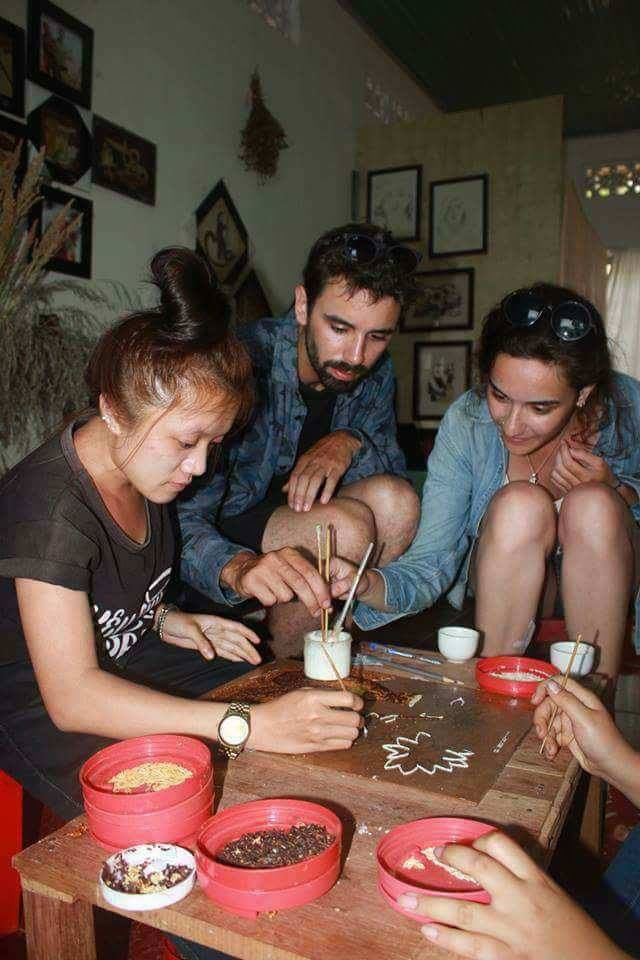 |
| Joining in: Staff at the gallery show visitors how to make a rice painting. — Photo Courtesy of Hồng Điệp |
.
Describing the procedure to develop a rice painting, Đăng said that first, the idea was sketched on paper and then painted onto hard paper or plywood.
“The key here is choosing the rice and roasting it into different colour tones. Depending on the roasting time, the colour will turn from white to a darker tone, and finally to black. Roasting the rice is also the toughest part, as we are not allowed to let it burst open, break down or burn. Hands must be steady while roasting so the colour is fresh,” she said.
The rice is then divided into small boxes and placed around the sketched painting. The artist then overlays the sketch with roasted rice, while picturing the light and dark area to be filled. The finishing touch is covering the work with polyurethane, which allows the colour to remain intact.
A completed rice painting must be a perfect combination of the colours and sizes of the rice. The artist has to master the trick of putting the rice into the right position, either straight, down or crosswise.
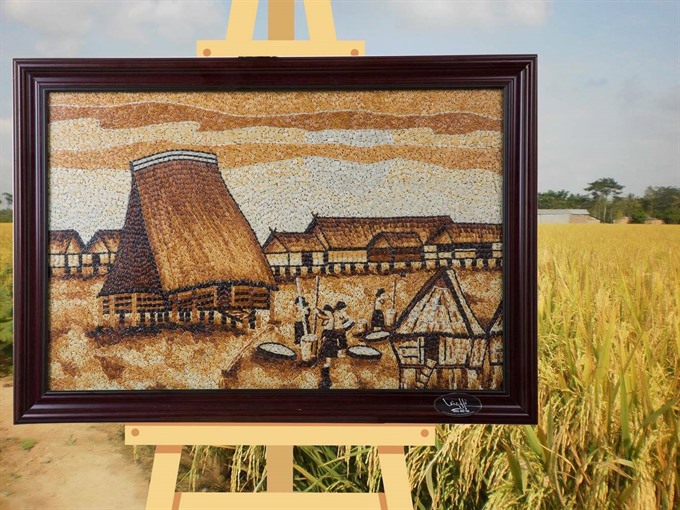 |
| Collectable: The paintings are priced from VNĐ200,000 ($8) to more than two million đồng ($88). — Photo Courtesy of Hồng Điệp |
.
Visitors to the gallery can observe 10 young people meticulously overlaying the rice on paintings by Đăng. Besides painting, she also gives lectures to the poor and disabled young people to help create a livelihood for them.
Nguyễn Thị Thanh Thảo, who has been working at the gallery for three years under the guardianship of Đăng, now creates rice paintings on her own, featuring local cultural highlights.
“I can now complete an entire rice painting on my own,” said Thảo.
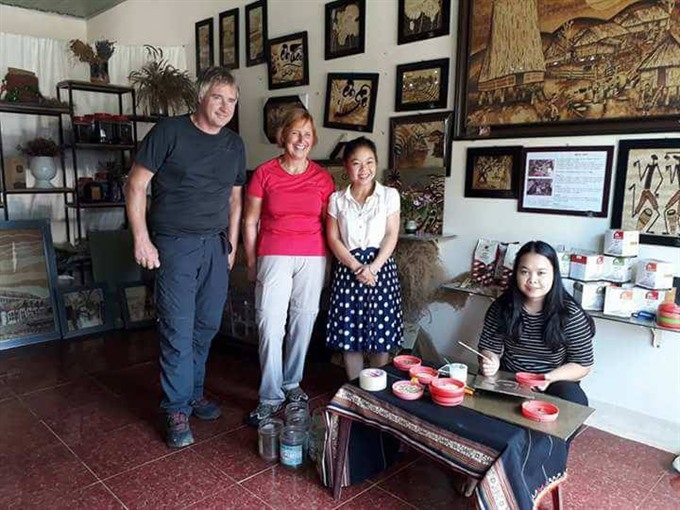 |
| On show: Artist Kiều Đăng (standing) poses with foreign tourists visiting the gallery. — Photo Courtesy of Hồng Điệp |
.
Rice paintings by Hồ Village are well known to tourists with artworks displayed at craft villages in Hội An, Đà Nẵng, Hà Nội and HCM City. Several charity foundations in America have ordered a large number of paintings priced from VNĐ200,000 (US$10) to more than 2 million ($88), depending on the size.
At present, Đăng is implementing a craft village tourism project at Kon Ktu Village. Her plan is to open one more rice-painting gallery at the village, so tourists can admire the artworks made by Đăng and experience or create their own rice paintings.
According to Đăng, the gallery at Kon Ktu will be completed at the end of the year and will be open for Tết (Lunar New Year).— VNS
Courtesy: Viet Nam News | October, 01/2017 | | by Phạm Thị Hồng Điệp


